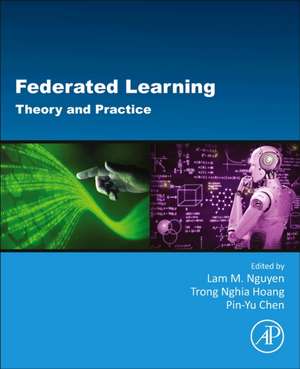Federated Learning: Theory and Practice
Editat de Lam M. Nguyen, Trong Nghia Hoang, Pin-Yu Chenen Limba Engleză Paperback – 14 feb 2024
emerging challenges stemming from many socially driven concerns of federated learning as a future public machine learning service. Part III concludes the book with a wide array of industrial applicati ons of federated learning, as well as ethical considerations, showcasing its immense potential for driving innovation while safeguarding sensitive data.
Federated Learning: Theory and Practi ce provides a comprehensive and accessible introducti on to federated learning which is suitable for researchers and students in academia, and industrial practitioners who seek to leverage the latest advance in machine learning for their entrepreneurial endeavors.
- Presents the fundamentals and a survey of key developments in the field of federated learning
- Provides emerging, state-of-the art topics that build on fundamentals
- Contains industry applications
- Gives an overview of visions of the future
Preț: 529.13 lei
Preț vechi: 783.10 lei
-32% Nou
Puncte Express: 794
Preț estimativ în valută:
101.25€ • 110.33$ • 85.32£
101.25€ • 110.33$ • 85.32£
Carte tipărită la comandă
Livrare economică 16-30 aprilie
Preluare comenzi: 021 569.72.76
Specificații
ISBN-13: 9780443190377
ISBN-10: 0443190372
Pagini: 434
Dimensiuni: 191 x 235 x 24 mm
Greutate: 0.74 kg
Editura: ELSEVIER SCIENCE
ISBN-10: 0443190372
Pagini: 434
Dimensiuni: 191 x 235 x 24 mm
Greutate: 0.74 kg
Editura: ELSEVIER SCIENCE
Cuprins
PART I: Optimization Fundamentals for Secure Federated Learning
1. Gradient Descent-Type Methods
2. Considerations on the Theory of Training Models with Differential Privacy
3. Privacy Preserving Federated Learning: Algorithms and Guarantees
4. Assessing Vulnerabilities and Securing Federated Learning
5. Adversarial Robustness in Federated Learning
6. Evaluating Gradient Inversion Attacks and Defenses
PART II: Emerging Topics
7. Personalized federated learning: theory and open problems
8. Fairness in Federated Learning
9. Meta Federated Learning
10. Graph-Aware Federated Learning
11. Vertical Asynchronous Federated Learning: Algorithms and theoretical guarantees
12. Hyperparameter Tuning for Federated Learning - Systems and Practices
13. Hyper-parameter Optimization for Federated Learning
14. Federated Sequential Decision-Making: Bayesian Optimization, Reinforcement Learning and Beyond
15. Data Valuation in Federated Learning
PART III: Applications and Ethical Considerations
16. Incentives in Federated Learning
17. Introduction to Federated Quantum Machine Learning
18. Federated Quantum Natural Gradient Descent for Quantum Federated Learning
19. Mobile Computing Framework for Federated Learning
20. Federated Learning for Privacy-preserving Speech Recognition
21. Ethical Considerations and Legal Issues Relating to Federated Learning
1. Gradient Descent-Type Methods
2. Considerations on the Theory of Training Models with Differential Privacy
3. Privacy Preserving Federated Learning: Algorithms and Guarantees
4. Assessing Vulnerabilities and Securing Federated Learning
5. Adversarial Robustness in Federated Learning
6. Evaluating Gradient Inversion Attacks and Defenses
PART II: Emerging Topics
7. Personalized federated learning: theory and open problems
8. Fairness in Federated Learning
9. Meta Federated Learning
10. Graph-Aware Federated Learning
11. Vertical Asynchronous Federated Learning: Algorithms and theoretical guarantees
12. Hyperparameter Tuning for Federated Learning - Systems and Practices
13. Hyper-parameter Optimization for Federated Learning
14. Federated Sequential Decision-Making: Bayesian Optimization, Reinforcement Learning and Beyond
15. Data Valuation in Federated Learning
PART III: Applications and Ethical Considerations
16. Incentives in Federated Learning
17. Introduction to Federated Quantum Machine Learning
18. Federated Quantum Natural Gradient Descent for Quantum Federated Learning
19. Mobile Computing Framework for Federated Learning
20. Federated Learning for Privacy-preserving Speech Recognition
21. Ethical Considerations and Legal Issues Relating to Federated Learning
